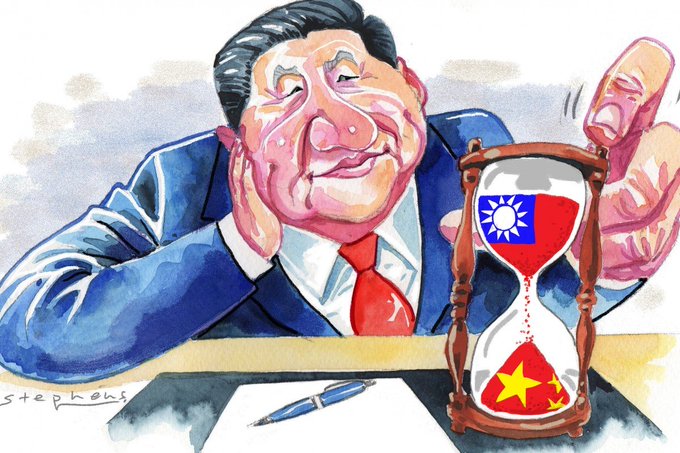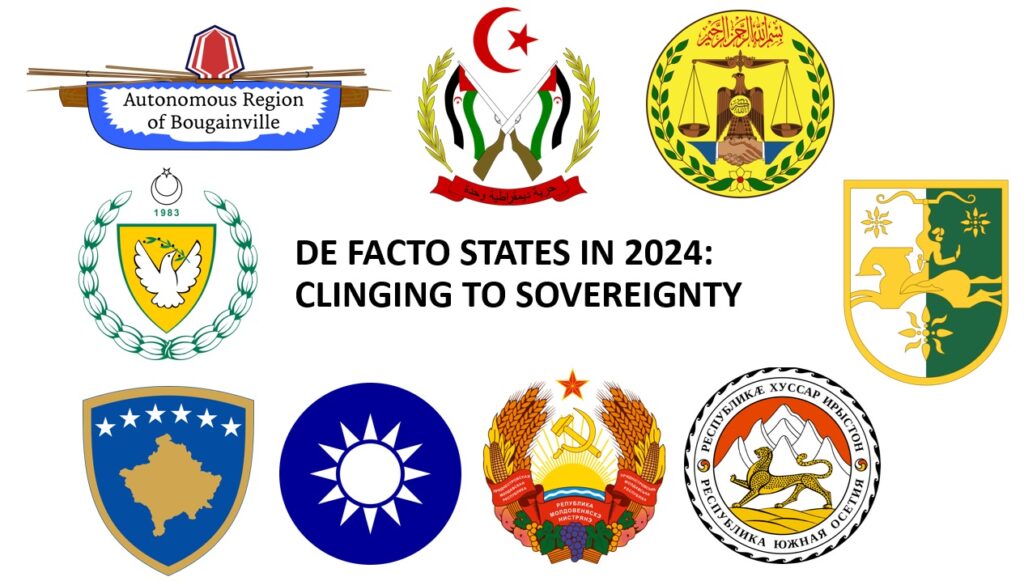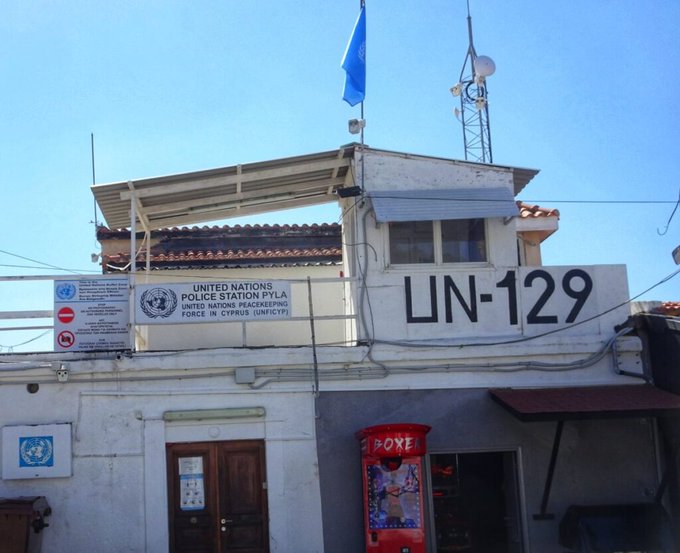Taiwan and the Diplomatic Squeeze
In mid-March 2023, the self-governing island of Taiwan lost another one of its already few diplomatic allies. Announcing the severing of diplomatic ties between Taiwan and Honduras on Twitter on March 15, Honduran president Xiaomara Castro noted that she had indeed instructed her Foreign Minister, Eduardo Reina, to formally establish ties with the People’s Republic of China (PRC). Reina set out for an official trip to Beijing about one week later, joining his Chinese counterpart Qin Gang for an attention-grabbing signing ceremony at Diaoyutai State Guesthouse in the Chinese capital. For the Chinese Communist Party, the decision made by Castro serves as yet another small victory in the diplomatic tug-of-war between the mainland and the island of Taiwan.
As the dust of diplomatic struggling in Honduras starts to settle, it appears ever more obvious that Taiwan remains perpetually exposed to diplomatic derecognition, especially as Beijing seems ever more determined to ramp up pressures on Taipei’s remaining allies. Nevertheless, the Honduran case, besides shedding light on the inherent fragility of diplomatic recognition for Taiwan, also arguably exposes a more complex web of factors leading to derecognition, apart from direct Chinese pressure. With two other allies – Guatemala and Paraguay – heading to the polls in the coming months, Honduras’ fate might offer valuable lessons for their respective diplomatic trajectories.
Pressure Mounting
It could have hardly come as a surprise when Xiaomara Castro used Twitter to end Honduras’ 74-year long relationship with Taiwan. The country’s first female president had already ruffled feathers in 2021 when she made it an election pledge to establish ties with Beijing, with rumours abound that economic incentives might have been partially responsible for her decision to consider cutting ties. Back then, Taiwanese president Tsai Ing-wen herself took to Twitter to highlight Honduras’ special status, noting that she would like “benefit the people […] and strengthen the longstanding Taiwan-Honduras partnership.” Her message, it seemed, bore fruit for at least the remainder of 2022 which saw the Castro administration primarily occupied with domestic issues and did not take concrete steps on the China question. Indeed, Taiwanese Vice President Lai Ching-te even attended Castro’s inauguration ceremony, instilling hope that she might still reconsider switching ties.
And, indeed, it was not until January 2023 that the incumbent Honduran government started edging closer to Beijing more openly. Then, Foreign Minister Eduardo Reina met with China’s Vice Minister for Foreign Affairs, Xie Feng, on the side-lines of Brazilian President Lula’s inauguration. The two men supposedly discussed Chinese support for another Chinese-built hydroelectric dam project, while inadvertently causing shudders in both Taipei and Washington. By mid-March 2023, however, the government in Tegucigalpa then moved beyond talk about development assistance and formalized diplomatic relations with the PRC.
Neither diplomatic attempts by the Biden administration nor open appeals from the Taiwanese government were able to avert the diplomatic breakaway. Tellingly though, Washington seemed to constrain itself even in light of the existing TAIPEI Act, which was once touted a strong underwriting framework for the U.S. to enhance its support for Taiwan. Biden merely once despatched his Special Advisor for the Summit of the Americas, Chris Dodd, to talk to Honduran officials, ultimately raising questions about Washington’s willingness to enforce the TAIPEI Act’s measures. Taiwan’s Foreign Minister Joseph Wu, on the other hand, explicitly warned Tegucigalpa of becoming overly dependent on Chinese financial support and eventually being debt-trapped by Beijing. Meanwhile, for the now diplomatically recognized administration in Beijing Taipei’s and Washington’s efforts to try and influence Castro – perhaps unsurprisingly – constituted “arm-twisting and bullying.”
And while the Taiwanese Foreign Ministry also immediately pointed to Honduras having been bribed into switching allegiance, the process of Honduras’ derecognition of the self-governing island indicates a more complex web of factors underpinning derecognition. This is, however, not to deny that pressures from Beijing were non-existent. In fact, the previous Honduran government under Juan Orlando Hernandez lamented that Beijing had sought to gain his government’s diplomatic recognition in exchange for Covid-19 vaccines. These pressure tactics were consequently harshly criticized by both the Taiwanese and foreign affairs officials in Washington – they all warnedthat such assertiveness is putting people’s lives at risk. It therefore is unsurprising that Chinese news media were quick to underscore that the switch was “an independent and courageous historical decision,” despite evidence to the contrary.
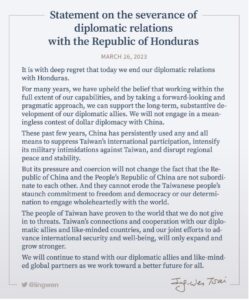
Image: This is how the 74-year long relationship ended
Yet, direct top-down pressure from Beijing only partially explains Honduras’ process of derecognition of Taiwan. In fact, the newly signed economic agreement between Beijing and Tegucigalpa actually speaks to more profound, and perhaps deeply-rooted, structural considerations on the Honduran side for severing ties. The already burdened economy took yet another considerable hit during the Covid-19 pandemic, with GDP figures declining rapidly by about nine percent. About 400,000 people lost their jobs within the first year of Covid, leading to a rapid increase of people living in poverty in addition to almost a third of the population that already faced extreme poverty prior to the pandemic. The combined effects of an economic contraction and a public health crisis must have put pressure on the incoming Castro government even prior to officially taking office, eventually resulting in severing ties with the less economically powerful Taipei.
Thus, the switch away from Taiwan to the PRC likely coincided with government plans to deliver upon its campaign promises to quickly boost economic growth, eradicate extreme poverty, and reduce social inequality. An alleged demand for 2.5 billion USD in aid restructuring by Foreign Minister Reina certainly lends credence to the incumbent administration being caught between a rock and a hard place financially, even though both Castro and Reina vehemently denied such request. In hindsight, it appears more likely that Beijing’s more recent developmental overtures towards Honduras merely came at the right time. According to Honduran officials, several attempts had been made to obtain additional financial support for larger infrastructure projects – including a hospital and a hydroelectric dam – but were primarily met with lofty promises and warnings of falling for Beijing’s “dollar-diplomacy” with the Taiwanese officials however failing to offer any concrete assurances themselves. By contrast, immediately after signing on to Beijing’s ‘One China’ interpretation, the news mouthpiece Xinhua went all out in proclaiming that the new relationship comes with “excellent growth potential”. The editorial went on to say that Honduras “embraced a golden opportunity to boost its social and economic development,” showcasing the penetrating rhetoric often employed by Chinese newspapers to counter critique towards Beijing’s geopolitical game.
Setting Precedent?
For president Tsai Ing-wen the almost simultaneously planned state visit to both Belize and Guatemala thus quickly turned into a matter of shoring up vital support. Guatemala – together with the last Taiwan stronghold in South America, Paraguay – are both headed for important national elections that could see a shift in government, and consequently a shift in Taiwan policy. Both have seen an uptick in Chinese pressure – including vaccine-for-recognition tactics also employed in Honduras – but their respective governments upheld ties, nonetheless. However, as once again exemplified by Honduras, national elections have always been a particularly worrisome period for Taipei’s diplomatic reach.
While in Guatemala, Tsai sought to underscore her administration’s commitment to its Central American ally. By demonstratively visiting a Taiwan-funded hospital in one of the nation’s poorest neighbourhoods, Chimaltenango, Tsai possibly intended to counter the harsh critique received from Honduran officials who complained about Taiwanese constraint in spending financial resources. The Guatemala-Taiwan relationship has proven resilientthroughout the years, with all Taiwanese presidents paying regular visits. These included a state-visit by Tsai who was afforded the opportunity to address the Guatemalan congress during which she praised the former’s efforts in supporting the self-governing island’s cause. And yet, even Foreign Minister Mario Bucaró’s latest “Stand by Taiwan”-visit in August 2022 could not veil that tensions exist that at times side-line the expansive cooperative bilateral network or personal connections at the political level.
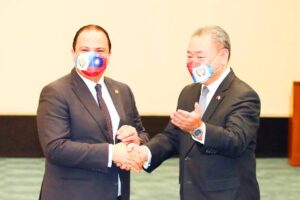
Image: Guatemalan Foreign Minister Mario Bucaró meeting with Taiwanese Vice-Minister of Foreign Affairs Alexander Yui (Source: The MFA / EPA-EFE)
First and foremost, while bilateral trade has remained largely consistent and has become increasingly institutionalized, trade with China has increased substantially, resulting in numerous Guatemalan business leaders to call on the government to no longer forego the economic opportunities of establishing ties with Beijing. These pressures in particular could become an election issue when Guatemalans head to the polls in June, a sentiment also echoed by China’s Ministry of Foreign Affairs. Just prior to Tsai touching down in Guatemala City, MFA spokesperson Mao Ning called on the Giammettei administration to “make the right decision.”
In Paraguay, meanwhile, liaising with Taipei has been largely beneficial, not only politically but also economically. The incumbent Benítez has remained steadfast in its recognition of Taiwan, in spite of recurring attempts by the opposition to force the government to change course. In March, President Mario Abdo Benítez once again heralded strong ties when he paid a personal visit to Taiwan, yet he himself will not stand for re-election. His Colorado party and prime candidate Santiago Pena continue to promote ties with the self-governing island, whereas the key oppositional figure Pedro Efraín Alegre Sasiain (Authentic Radical Liberal Party) already announced that his party’s win would go hand in hand with a diplomatic switch. Sasiain in particular has been an outspoken proponent for the nation’s fruitful beef exporting industry which has long lamented that access to mainland China’s meat market would constitute a major win for local businesses and farmers.
Economic considerations such as enhancing the vital beef industry could prove decisive in an election that will likely see many voters expressing a strong desire for better economic opportunities in the post-Covid era. As such, it may not require direct Chinese pressure or influence campaigns to sway Paraguayan voters, instead domestic concerns might trump the geopolitical dimension. Even though no official polling figures exist, this year’s national election could prove tight between Alegre and Pena, making Taiwan’s usually steadfast ally look far more fragile and willing to consider derecognition.
Overall, it is likely that Honduras will not be the last Taiwanese ally considering a switch in favour of mainland China. With the elections in both Guatemala and Paraguay still undecided, it remains to be seen whether the respective opposition parties and pro-Beijing politicians will be able to advocate for diplomatic derecognition once in office. Concurrently, it seems that Guatemala might retain ties with Taipei, not only because incumbent president Giammettei recently boosted Taipei’s confidence when personally meeting Tsai Ing-wen, noting that the self-governing island was “the one and only true China” and treating his Taiwanese counterpart to a lavish state dinner. Meanwhile, Paraguay’s position appears a little less certain with just a few weeks to go until the election.
Yet, the Honduran case has vividly showcased that Taiwan’s often effective niche diplomacy and small-scale developmental support are coming under pressure. Indeed, it appears to no longer be a reliable means to retain allies, particularly those disproportionately affected by economic hardship. For the Castro administration, seeking to overcome strong economic headwinds and appealing to a poverty-stricken population seemingly outweighed the positive aspects of maintaining ties with Taipei – such as a fairly strong trade partnership, particularly for coffee and shrimps, and bottom-up development projects. For now, the diplomatic struggle between Beijing and Taipei might be on pause, yet uncertain elections periods in Guatemala and Paraguay could upend the relative calm and further delimit Taiwan’s diplomatic space.
Author: Larissa Stünkel


